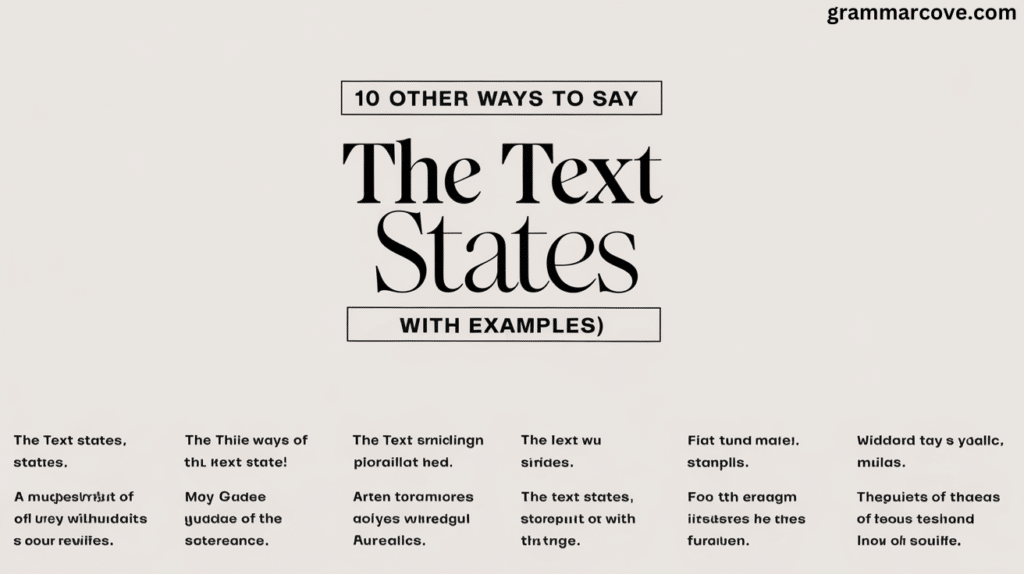In the world of academic writing, using varied language is crucial for maintaining reader engagement and ensuring clarity. Often, writers rely on phrases like “the text states,” but there are many alternatives that can enhance your writing. Below, we’ll explore ten different ways to express the same idea, complete with scenario examples that illustrate their use in various contexts.
Here are the ten alternatives to “the text states” presented in bullet points:
- The Document Asserts
- The Passage Claims
- The Article Articulates
- The Writing Specifies
- The Section Mentions
- The Manuscript Declares
- The Narrative Describes
- The Content Reveals
- The Excerpt Indicates
- The Piece Conveys
1. The Document Asserts
In formal writing, particularly when discussing research or legal documents, using a phrase like “the document asserts” can add weight to your argument.
Scenario Example: Email to a Colleague
Subject: Review of Legal Brief
Hi Sarah,
I’ve reviewed the legal brief we discussed, and I believe the document asserts that our position on the matter is solid. Specifically, it emphasizes the necessity of adhering to the original contract terms.
Best,
James
2. The Passage Claims
This phrase works well in literary analysis, allowing the writer to present an assertion from a text.
Scenario Example: Academic Paper
In her analysis of the poem, Jenna notes that “the passage claims that love transcends time and space.” This interpretation invites a deeper understanding of the emotional resonance the author intended.
3. The Article Articulates
When discussing journalism or opinion pieces, “the article articulates” helps convey the author’s intent clearly.
Scenario Example: Blog Post Review
In his review, Tom argues that “the article articulates the complexities of modern parenting effectively.” He appreciates how the author balances personal anecdotes with research findings.
4. The Writing Specifies
Using this phrase emphasizes clarity and precision in the text, making it ideal for technical documents.
Scenario Example: Technical Report
In our latest report, the writing specifies that adherence to safety protocols is non-negotiable. This emphasis ensures that all team members are aware of their responsibilities.
5. The Section Mentions
When referencing specific parts of a larger document, this phrase can be particularly useful.
Scenario Example: Research Summary
In the summary of the research paper, the section mentions the implications of climate change on biodiversity. This insight is critical for understanding the broader impact of our findings.
6. The Manuscript Declares
This phrase often appears in academic contexts where authoritative statements are made.
Scenario Example: Thesis Submission Email
Subject: Thesis Submission
Dear Dr. Lee,
I am excited to submit my thesis titled “The Impact of Social Media on Youth.” The manuscript declares that social media has both positive and negative effects on adolescent mental health, which I believe is an important area for further research.
Sincerely,
Michael
7. The Narrative Describes
In creative writing or storytelling contexts, this phrase can enhance the narrative flow.
Scenario Example: Creative Writing Workshop
During the workshop, Sarah read a passage from her story where “the narrative describes the protagonist’s internal struggle beautifully.” This vivid depiction allowed the audience to connect emotionally with the character.
8. The Content Reveals
This phrase highlights what information a text provides, making it effective for analyses.
Scenario Example: Book Review
In her review, Lisa emphasizes that “the content reveals a hidden layer of societal critique.” This statement encourages readers to look beyond the surface of the narrative.
9. The Excerpt Indicates
This phrase works well when citing specific portions of a text to support an argument.
Scenario Example: Literary Criticism
In her analysis of the novel, Amanda points out that “the excerpt indicates a shift in the protagonist’s perspective.” This insight invites readers to consider the character’s growth throughout the story.
10. The Piece Conveys
Using this phrase can make your writing sound more engaging and less repetitive.
Scenario Example: Opinion Piece Submission
Subject: Submission of Opinion Piece
Dear Editor,
I believe that the piece conveys a powerful message about the importance of community service in today’s society. By sharing personal stories, we can inspire others to get involved.
Best,
Jessica
Conclusion
In academic writing, varying your language not only enhances clarity but also engages your readers more effectively. By integrating phrases like “the document asserts” or “the piece conveys,” you enrich your text and improve your academic writing skills. Remember, using professional language doesn’t mean you have to stick to the same phrases over and over. Instead, aim for a fluid, engaging style that captures your audience’s attention.
By exploring these alternatives to “the text states,” you can add depth to your writing and better express your ideas. Whether you’re working on a thesis, a blog post, or an email, these phrases can help you articulate your thoughts more dynamically. Keep practicing these techniques to ensure your writing remains fresh and impactful.


